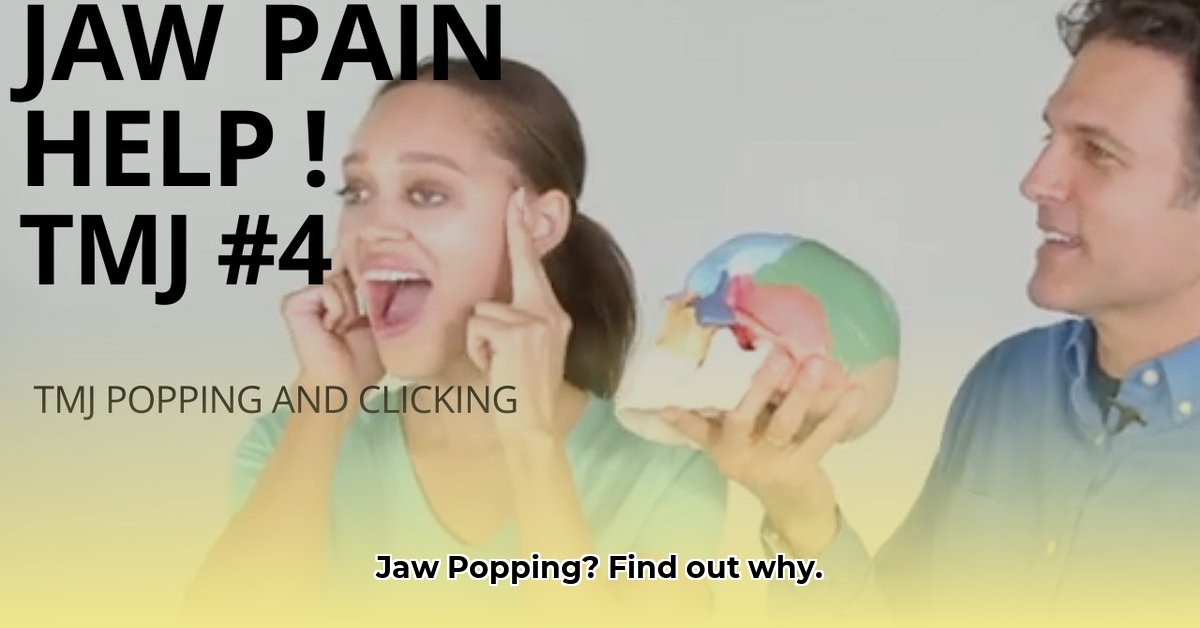Understanding Jaw Popping
That clicking, popping, or grating sound in your jaw can be disconcerting. It likely originates from your temporomandibular joint (TMJ), the hinge connecting your lower jaw to your skull. This complex joint allows you to talk, chew, and yawn. So, when it makes noise, it’s natural to wonder why.
What Causes Jaw Popping?
An occasional pop is usually harmless, often caused by ligaments stretching during activities like yawning or taking a large bite. However, frequent popping, accompanied by pain or limited movement, might indicate a temporomandibular disorder (TMD). TMD involves problems with the joint itself, surrounding muscles, or tissues.
Could It Be TMD? Recognizing the Symptoms
A popping jaw is often just one symptom of TMD. Others may include:
- Jaw pain or tenderness
- Earaches, headaches, neck pain
- Difficulty chewing
- Jaw locking or sticking
- Facial pain
- Ringing in the ears (tinnitus)
- Dizziness
If you experience these symptoms along with jaw popping, consult a doctor or dentist.
Delving Deeper into the Causes of Jaw Popping
Several factors contribute to jaw popping. Here’s a more detailed look:
Common Culprits Behind the Pop
-
Bruxism (Teeth Grinding/Clenching): This often-unconscious habit, common during sleep, strains the TMJ.
-
Habits: Chewing gum, biting nails, or resting your chin on your hand can stress the TMJ over time.
-
Arthritis: Cartilage degeneration in the TMJ, due to osteoarthritis or rheumatoid arthritis, can cause inflammation and clicking.
-
Malocclusion (Misaligned Bite): An uneven bite stresses the TMJ, contributing to popping.
-
TMJ Disorders: A displaced disc within the TMJ can obstruct movement, leading to clicks or pops.
-
Myofascial Pain Syndrome: This chronic pain condition affects jaw muscles, causing tightness, discomfort, and potential popping.
-
Stress and Anxiety: Stress-induced jaw clenching can contribute to TMJ issues.
-
Trauma: A blow to the jaw can damage the TMJ and cause popping.
-
Skeletal Abnormalities: Differences in jaw structure can contribute to popping.
-
Hypermobility: Loose ligaments in the TMJ allow excessive movement and popping noises.
When to Seek Professional Advice
Occasional, painless clicking is usually normal. However, consult a doctor or dentist if you experience:
- Persistent jaw pain or tenderness
- Limited jaw movement or locking
- Changes in jaw sounds (grinding or grating)
- Swelling around the jaw joint
- Referred pain to the ears, head, or neck
- Pain while chewing or talking
Understanding the cause is crucial for effective treatment. Ignoring persistent symptoms could lead to chronic pain or further damage. Ongoing research continues to explore TMJ complexities, and treatments may evolve. Consult your healthcare provider for the latest information.
Recognizing the Symptoms of Jaw Problems
Beyond the audible pop, other symptoms can signal a jaw issue, often related to TMD. These include:
- Pain: A dull ache or sharp throbbing in the jaw, face, ears, or head.
- Limited Movement: Difficulty opening your mouth fully or a locked jaw.
- Changes in Bite: A shift in how your upper and lower teeth fit together.
- Other Sensations: Ear fullness, ringing in the ears (tinnitus), dizziness, or vertigo.
If your jaw popping is accompanied by these symptoms, seek professional advice.
Treatment Options for Jaw Popping
Several treatments exist, ranging from home remedies to professional interventions.
Home Care Strategies
For mild, painless popping:
- Warm/Cold Compresses: Apply heat or ice to soothe muscles and reduce inflammation.
- Dietary Changes: Avoid hard or chewy foods.
- Over-the-Counter Pain Relief: Ibuprofen or naproxen can help with mild discomfort.
- Jaw Exercises and Relaxation Techniques: Gentle stretches and relaxation can improve mobility and reduce tension.
Professional Treatments
For persistent pain or limited movement:
- Medications: Prescription pain relievers or muscle relaxants.
- Oral Splints (Mouth Guards): Reposition the jaw, reduce clenching, and protect teeth.
- Physical Therapy: Improve jaw mobility, strength, and function.
- Injections: Trigger point injections or Botox for pain and muscle spasms.
- Surgery: A last resort for severe cases unresponsive to other treatments.
Addressing underlying issues like stress and posture is also important. Ongoing research may lead to new treatment approaches. Consult a qualified TMJ specialist (dentist, oral surgeon, or orofacial pain specialist) for personalized advice.
When to Seek Help for Jaw Popping
While occasional, painless popping is likely normal, certain signs warrant professional attention:
- Frequent popping
- Pain with jaw movement
- Limited jaw mobility
- Headaches, earaches (tinnitus), neck/shoulder pain, dizziness
- Jaw dislocation (requires immediate medical attention)
Your dentist can assess for dental problems and refer you to a specialist if needed. Your primary care physician can provide initial guidance and referrals. Other specialists, like orthodontists or physical therapists specializing in jaw issues, can also offer valuable insights.
Finding the Right Professional
Consider consulting:
| Professional | Expertise |
|---|---|
| Dentist | Dental issues, initial assessment, referrals |
| Primary Care Physician | General health, referrals |
| TMJ Specialist | Specialized TMJ diagnosis and treatment |
| Orthodontist | Bite alignment, jaw structure |
| Physical Therapist (Jaw) | Jaw exercises, pain management |
Treatment depends on the underlying cause and can range from lifestyle changes and self-care to physical therapy, mouthguards, and, in rare cases, surgery. Preventive measures such as stress management, avoiding chewing habits, and using a mouthguard can help prevent future problems. Consult your healthcare provider for personalized advice.
This information is for educational purposes only and is not a substitute for professional medical advice. Consult a qualified healthcare provider for any health concerns or before making any decisions related to your health or treatment.
- Leak-Proof Glass Food Containers with Locking Lids Keep Food Fresh - February 3, 2026
- Glass Storage Containers With Glass Lids That Lock for Freshness - February 2, 2026
- Locking Glass Food Storage Containers for Organized and Fresh Meals - February 1, 2026










